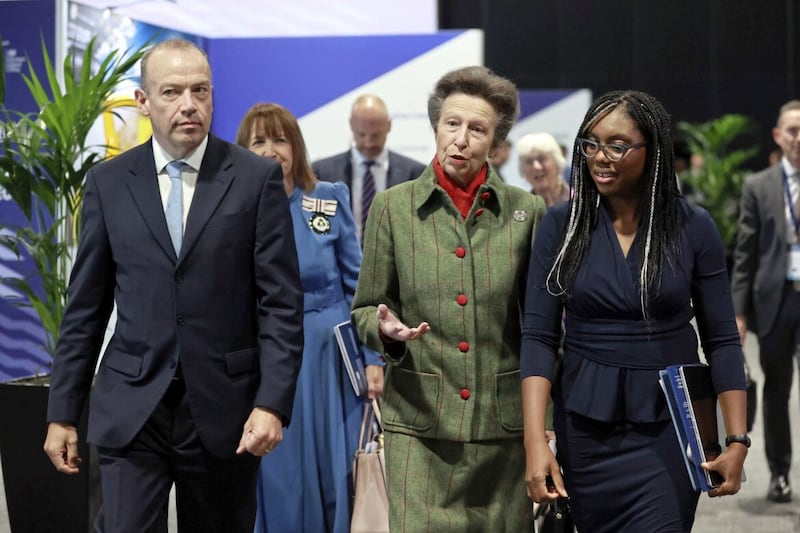JUNE’S lower-than-expected inflation figures has raised hope that interest rates could soon be at a peak – but there’s still a long way to go for Northern Ireland businesses grappling with issues on several fronts.
In its latest decision, the Bank of England was clear that it thinks tighter monetary policy is having a definitive impact on the economy. CBI members have told me demand is softening, locally and globally.
There is now speculation that interest rates – which stand at 5.25 per cent – could peak below six per cent, a shift in expectations from just a few months ago. However, the Bank of England has signalled that they could remain higher for longer to tackle inflation.
There is a growing expectation that inflation will fall back towards the year’s end, which would come as a relief for households and firms in Northern Ireland that have struggled with the cost of living and doing business. However, this expectation is only likely to be realised if there are no other economic shocks such as an interruption to energy or global supply chains.
The latest GDP figures highlighted some resilience in the UK economy with 0.2 per cent growth during quarter two. However, the situation is fragile and locally manufacturers are experiencing weaker demand in export markets. Some manufacturing exporters have reduced production shifts and are encouraging employees to take holidays aligned to the weaker demand cycle.
A large Northern Ireland food producer, which runs its own customer survey, reported a significant fall in consumer confidence throughout July. Local retailers and food producers also see a stark difference in the shopping habits of low and middle-income households which is a cause for concern. One retailer told me that low-income households are cutting back on the most basic items by buying significantly less quantity.
Last week the National Institute of Economic and Social Research revealed that the UK economy had lost five years of economic growth due to Brexit, Covid and Ukraine conflict. Its research appears to support a CBI forecast that the UK economy will remain 7 per cent smaller than its pre-pandemic trend by the end of 2024.
The International Monetary Fund’s Global Growth Report said UK output is projected to grow by 0.4 per cent in 2023, but even that more positive news around narrowly missing recession was offset by the fact that the UK’s growth trajectory lags all but one of the G7 countries - Germany.
There is no doubt that times are tough. Innovative and courageous thinking is needed to move things into a better economic climate. On the upside, supply chains are starting to recover from Covid lockdowns and firms are reporting some global price pressures are?easing.
However, the lack of skilled labour remains a significant challenge and is a particular concern for those firms who wish to invest in low carbon energy solutions or artificial intelligence (AI).
In these areas, firms complain that there is a large deficit in the local skills pipeline which is impacting progress and ambition. Some companies also cite ‘access to finance’ as an investment barrier and those local projects which have been held up over planning issues will get more expensive by the day.
The CBI will be focusing on how the Treasury can stimulate investment and improve business competitiveness in the Government’s Autumn Statement. We are having conversations with members around what would support them to invest in the skills, technology, and the low carbon capital that they need to deliver sustainable growth in their respective industries.
Our economics team will be costing these industry ‘asks’ and encouraging the Treasury to seize the opportunity to support business growth.
Last week a news report in Northern Ireland highlighted Ireland’s budget surplus which is set to reach £56.3 billion by 2027. It is hard not to question how such economic disparities can develop between two sides of an island. The Irish Government’s investment in education, infrastructure and offering a fiscally attractive taxation package to foreign investors, stand out as the main differentiator.
Without doubt the Stormont stalemate is negatively impacting our ability to make economic progress. Last week the Taoiseach Leo Varadkar called for the UK and Irish governments to work ‘hand-in-glove’ to apply both pressure and support for the resumption of the Assembly. History tells us that it is only when they jointly tackle these Northern Ireland ‘political bottlenecks’ that progress is made.
Companies across Northern Ireland are united in their view that political stability would bring clarity, confidence and economic opportunity to the business community. Chief executives tell me that it is much easier to convince global headquarters to put more money in this region when there is a shared government working for everyone.
It goes without saying that local companies are deeply disappointed that the Executive will most probably not be restored in time for next month’s Investment Conference in Belfast.
:: Angela McGowan is director of CBI Northern Ireland







